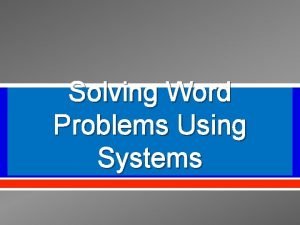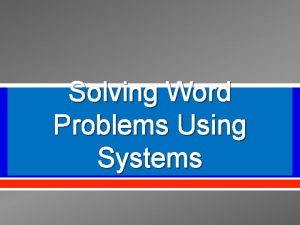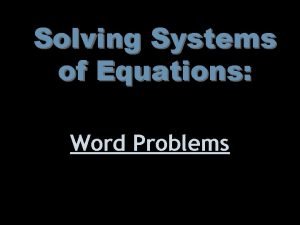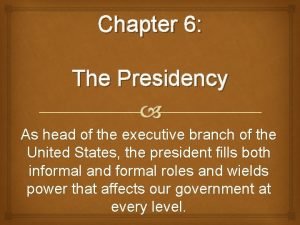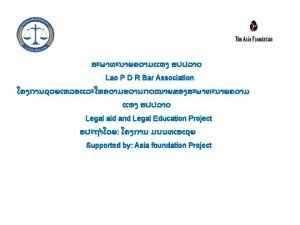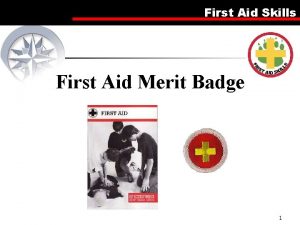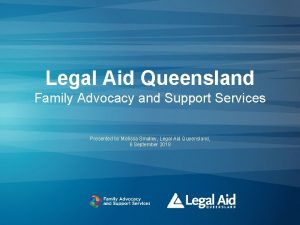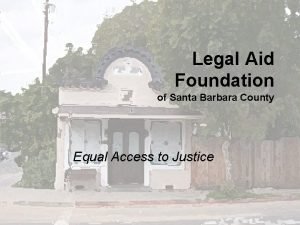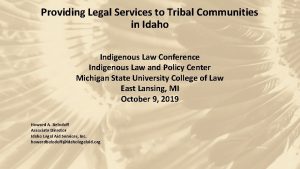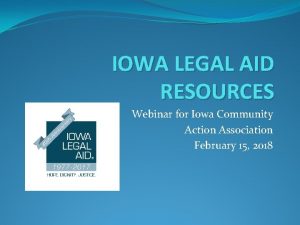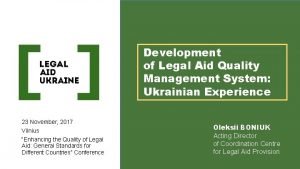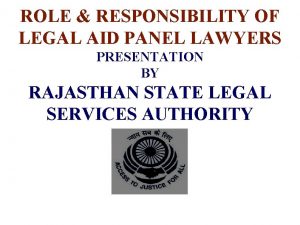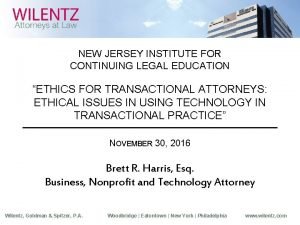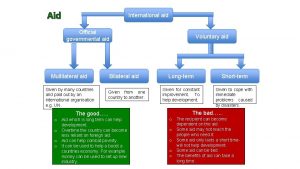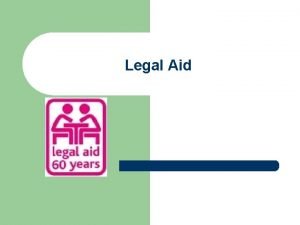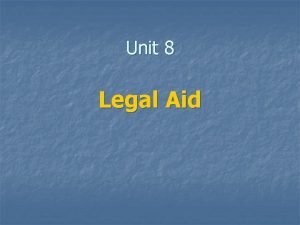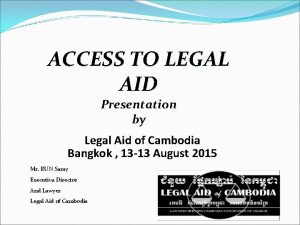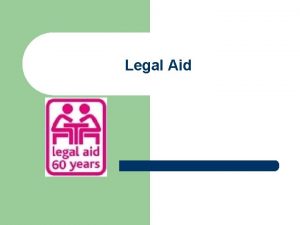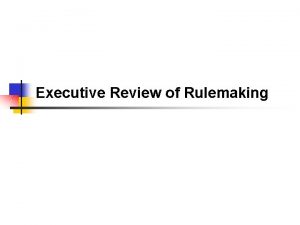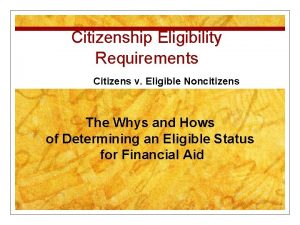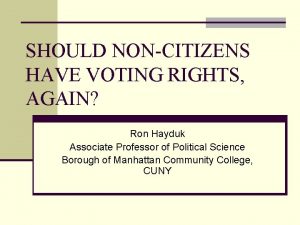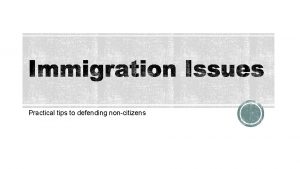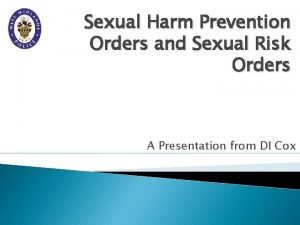NONCITIZENS AND THE NEW EXECUTIVE ORDERS Legal Aid

















- Slides: 17

NON-CITIZENS AND THE NEW EXECUTIVE ORDERS Legal Aid Society of Rochester

WHO IS A NON-CITIZEN? asylum seekers and refugees; lawful permanent residents (“green card” holders); those seeking lawful permanent residence through a spouse or other close relationship, as well as through employment; those in the U. S. on nonimmigrant (temporary) visas such as tourists, students, employed professionals, etc. those who are present without status or “undocumented”.

Executive Orders On January 25, 2017, Trump issued 2 Executive Orders altering immigration enforcement policies The orders address: Eliminating three-tiered Obama-era enforcement priorities � Refusing entry of visa holders from certain countries � Limitations on refugee admissions (fewer refugees will enter the US); � Increasing border and interior enforcement activities (including building a wall & penalizing sanctuary cities); � Increasing detention space; � Exercising statutory authority to enforce expedited removal within 100 miles of any border (includes Rochester); � Engaging state and local law enforcement officers in immigration enforcement (and punishing localities that refuse to engage); and � Tripling the number of Border Patrol and ICE officers. �

EO’s–DETENTON AND REMOVAL PRIORITIES for Undocumented Clients (a) Convicted of ANY criminal offense; (b) Charged with ANY criminal offense, where such charge has not been resolved; (c) Committed acts that constitute a chargeable criminal offense; (d) Engaged in fraud or willful misrepresentation in connection with any official matter or application before a governmental agency; (e) Abused any program related to receipt of public benefits; (f) Subject to a final order of removal, but have not complied with legal obligation to depart the United States; or (g) In the judgment of an immigration officer, otherwise pose a risk to public safety or national security (* note gang allegations*)

WHAT IS REMOVAL? A noncitizen may be both deportable (potentially expelled from the U. S. ) and inadmissible (not permitted to enter the U. S. or gain permanent residence in the U. S. ) if s/he is convicted of a criminal offense. The process of expelling a person or not permitting him or her to enter is called the removal process.

THE PLAYERS Department of Homeland Security Immigration and Customs Enforcement (ICE) – the second largest law enforcement agency in the country with vast resources and infrastructure. ICE is responsible for investigations, arrests, detention and deportation of non-citizens. • Enforcement and Removal Operations (EOS) • Homeland Security Investigations (HIS) US Citizenship and Immigration Services (CIS) – no enforcement role; awards benefits and naturalization; includes an Asylum Corps to adjudicate asylum applications and a specially trained corps of officers to adjudicate DV applications. Customs and Border Protection (CBP) – includes Border Patrol; inspects people and goods entering the United States.

THE REMOVAL PROCESS In general, an immigration court must order removal although there are exceptions. Due process protections apply. The removal process includes expulsion after lawful admission (deportation) or the exclusion of someone seeking admission to the U. S. (inadmissibility). There is no right to an attorney at Government expense. Removal proceedings are deemed civil proceedings and the 6 th Amendment does not attach. The rules of evidence apply loosely. There are some appellate rights: Board of Immigration Appeals and limited Circuit Court review.

How Might an Arrest Occur? Border Patrol encounter at border (100 miles) or at a checkpoint (route 87 in NYS) Law enforcement/traffic stop which then involves DHS CBP stop at port-ofentry (e. g. airports, local bridges in Buffalo area) Concerned citizens’ reports Prisons, Jails, Probation, Parole, Court Remediation of immigration status

Increased Presence of Border Patrol and ICE Stopping people on buses, trains and airplanes within the United States and asking for identification; Checkpoints Street Stops Enforcement at ethnic restaurants Police Investigations Checking court dockets Checking booking records at jails Increased authority and discretion to individual immigration officers

County Jails and Immigration Detainers • • • ICE officers present in jails, may receive notification of every non-citizen arrest An ICE detainer is a written request by DHS, that a local jail or other law enforcement agency detain an individual for an additional 48 hours after his/her release date in order to provide ICE agents time to decide to take the individual into federal custody for removal and to transfer custody to ICE Some jurisdictions honor ICE detainers and will hold person

Will ICE Arrest People Going to Court? Yes, they will and they have Risks in Family Court: � Fingerprinting household members of relative placement � Possible cooperation between prosecutor and ICE � Caseworkers inquiring about immigration status at home visits � Abusers calling ICE on DV victims seeking an order of protection

Sanctuary Jurisdictions • • • Jurisdictions that will not use local resources to enforce immigration laws; Places public safety over assisting federal government in enforcement practices; Law enforcement, other government entities within jurisdiction will not inquire about immigration status when providing services; Undocumented people are victims of labor exploitation, sextrafficking; and domestic violence – victims of these practices will feel safe to call and ask for help; Does not create legal status; What about overlapping jurisdictions (County, Federal)

Unpredictability of Enforcement Issues Created: � Can I really call the police for help? Issues with overlapping jurisdiction; � What will happen to my children if I am arrested? Establishing guardianship for US Citizen children Avoiding placement in foster care Many returning to unsafe or deeply impoverished countries cannot bring children with them � What will happen to my property and personal belongings? Is Power of Attorney available and for what purpose? Keep all important documents in a safe place

What Should Students Do If Encountered By Law Enforcement?

If ICE Is At The Door § § § § Constitutional Rights Still Apply ! They do not have to open the door if ICE does not have a warrant Ask to see ID and for a warrant to be slipped under the door. ICE agents are allowed to say they are the police. Take a photo of any warrant slipped under the door. Clients can refuse to answer any questions ! “ They do not have to provide travel documents to ICE

Street Stops and ICE • • • Person should remain silent and walk away They can ask the police if they are free to go If no, “I want to use my right to remain silent. I want to speak to a lawyer. ” Do not consent to any search Do not lie or give false documents. Do not answer questions about place of birth, criminal, family court or immigration history.

Questions
 Casey orders 3 pizzas
Casey orders 3 pizzas Casey orders 3 pizzas and 2 orders of breadsticks
Casey orders 3 pizzas and 2 orders of breadsticks Casey orders 3 pizzas and 2 orders of breadsticks
Casey orders 3 pizzas and 2 orders of breadsticks Are executive orders informal powers
Are executive orders informal powers Are executive orders informal powers
Are executive orders informal powers President's formal and informal powers
President's formal and informal powers Legal aid meaning aim and objective
Legal aid meaning aim and objective First aid merit badge first aid kit
First aid merit badge first aid kit Green hill park medical centre
Green hill park medical centre Cairns legal aid
Cairns legal aid Garry tetalman
Garry tetalman Legal aid idaho
Legal aid idaho Legal aid iowa
Legal aid iowa Legal aid management system
Legal aid management system Legal aid panel
Legal aid panel John brown poster
John brown poster Nj institute for continuing legal education
Nj institute for continuing legal education Nj ebike laws
Nj ebike laws
